If you want to depress yourself going into the new year, go ahead and check out the movie Don't Look Up on Netflix. It is categorized as a "dark comedy&qout; -- a parody of modern politics and plutocracy -- but it rings so true, and is so frustratingly believable given the events of the past 5 years, that I have trouble labeling it as a "comedy". It induced facepalms and fury rather than laughs, and its pervasive bleakness offers no hope for our future. It feels less like a warning, and more like a eulogy for the human race. And I recommend it so completely.
It's worth watching almost for Mark Rylance's performance of Bash Cellular CEO Peter Isherwell. His send-up of an eccentric tech billionaire (think Steve Jobs meets Jeff Bezos meets Elon Musk) is one of the few outright funny things about the movie that isn't also depressing.
I've read some people online suggesting that Don't Look Up might be this generation's Idiocracy. I'm not sure if I agree with the comparison. Idiocracy has a sort of naïve optimism that makes it charming. It is a stark warning of a possible dystopian future brought on by corporate greed, public ignorance, and the out of control birth rate of stupid people. But while the characters are all idiots, they are at least well-meaning idiots. They could and (more importantly) would do right by everyone else if they only hadn't been brainwashed by corporate propaganda all their lives ("Brawndo has the electrolytes plants crave"). It's a world run by, and completely populated by, Homer Simpsons: dumb, but well-meaning buffoons.
In Idiocracy, the average-intelligence time-traveler from the present gets a high score on an intelligence test, and is immediately sworn in as a high-ranking member of the president's cabinet. After demonstrating that watering crops with water instead of Gatorade will cause them to grow, he is promoted to vice president, and eventually elected president. The people of Idiocracy may be the dumbest humans to ever live, but they still value intelligence, competency, and demonstrable truth. There's a hopeful optimism there that things will get better if they can only be shown the error of their ways.
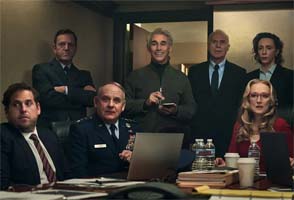 Copyright: 20th Century Fox, 2006.
Copyright: 20th Century Fox, 2006.
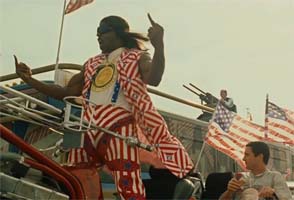 Copyright: Netflix, 2020.
Copyright: Netflix, 2020.
Don't Look Up is being compared to Idiocracy. I'm not sure the comparison is apt.
Idiocracy is far less cynical and more hopefully optimistic. [More]
My biggest concern going into this new Twilight Zone reboot was with the hour-long format of its premiere. The first episode, "The Comedian" (which was available on YouTube for free as a preview of the show to come), was a bit overlong and dragged considerably in the second half. It had made its point by about halfway through, we could all see where the episode was going, and it insisted on going on for another 20 minutes despite not really having anything left to say.
OK, yeah sure, in the past I've complained about shows like Fox's Cosmos reboot being too short. Commercials cutting Niel DeGrasse Tyson's Cosmos reboot to only 45-ish minutes was simply not enough time for Tyson to give more than an elementary overview of the grandeur of nature or science.
However, The Twilight Zone isn't an educational show about "all that is, or ever was, or ever will be"; it's an anthology of science fiction parables and allegories. Parables and allegories are usually short and simple stories intended to convey a moral or lesson or insight into the human condition. The Twilight Zone doesn't really need a full hour to tell its stories. The twists are easy enough to see coming. This isn't The Sixth Sense, or Fight Club, or American Psycho, or Se7en, or something similar that actually needs a two-hour runtime to build up suspense and intrigue and dot the entire runtime with clues for its twist ending.
The pilot episode "The Comedian" felt over-long.
I was happy to see that episodes later in the first season have variable runtimes. The second episode, "Nightmare at 30,000 Feet" (which is actually a totally different story than the "Nightmare at 20,000 Feet" classic that it is homaging with its title), is under 40 minutes, filled out its runtime better, and enjoyed much tighter overall pacing. The following episode, "Replay", clocked in at 45 minutes, and also enjoyed a much tighter script.
... [More]
55a4fecd-3e7f-4cf2-be91-446004c60d06|1|4.0
Tags:The Twilight Zone, Jordan Peele, CBS, all access, streaming television, Rod Serling, science fiction, anthology, parable, allegory, racism, bigotry, toxic masculinity, date rape, social justice, social injustice, plot twist
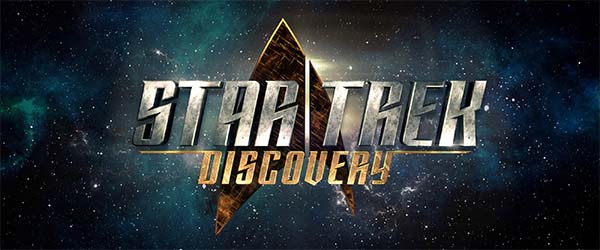
I finally got around to watching the entire first half of the first season of CBS's Star Trek: Discovery series. I'm running behind on this show since I don't have a CBS All Access subscription. I've been deliberately avoiding information about the post-hiatus episodes, so information and opinions in this post may be outdated by the time I get around to publishing it. Maybe later episodes have resolved some of these complaints. If so, feel free to ignore such comments, or let yourself be giddy with the dramatic irony. Oh, and feel free to comment, even if you do so with spoilers. I won't be offended or upset.
Before I go into the details, I want to at least try to dispel the idea that I'm just an angry fanboy who is butt-hurt that the series doesn't strictly adhere to continuity. That's come up when I've talked about this show to people in person. So I'm not going to spend this review talking about how the Klingons look different. I don't care that they look different. I've already addressed that. It does bother me that the Klingons also seem to be culturally dissimilar to the established Klingons, but I won't harp on that either. I'm not going to complain about how the uniforms and badges are anachronistic. I got that out of my system before the show even launched. I'm not going to complain that the tech looks more advanced than Original Series tech. These complaints are mostly pedantic and silly. In fact, the aesthetic look of the show is actually one of its strengths.
The visual style is one of Discovery's strengths, even though almost all of it is anachronistic.
I'm also not going to complain about Burnham being Spock's step sister, nor am I going to assert that Spock having a human step sister that we never knew about breaks canon. Spock was always very closed off about his childhood and family. In the Original Series episode "Journey to Babel", Kirk and McCoy meet Sarek and Amanda without having any idea that they are Spock's parents. Heck, this even happens in the second season, after Spock returns home to fight for his arranged marriage in "Amok Time". McCoy even later delights at the revelation that Spock had a pet "teddy bear" as a child -- even though that "teddy bear" had 9-inch fangs.
Kirk and McCoy didn't even know that Sarek and Amanda were Spock's parents.
Even more infamous is when Star Trek V created a half-brother for Spock out of wholecloth. When trapped in the brig, Kirk even says "I know Sybok isn't your brother because I happen to know for a fact that you don't have a brother!" To which Spock responds "Technically you are correct. I have no brother.... I have a half-brother." I can easily see the same exchange being made in reference to Burnham: "Technically, you are correct. I have no sister.... I have a step-sister."
Kirk confronts Spock in Star Trek V, saying he knows Spock has no brother.
So yeah, I don't really have an issue with Burnham being a step-sister to Spock. I would prefer that the writer have not ret-conned Spock's character [yet again] because I feel like this just serves as an excuse to eventually introduce Spock into the series as a cheap cop-out way of increasing fan interest if the show starts to tank -- just like how Into Darkness had Leonard Nimoy just sitting around. The writers have that ace up their sleeve, and it's only a matter of time before they use it.
Spock plays his usual game of semantics to justify his obscurance of the truth.
Instead, I want to talk about how I feel that the show betrays the series' foundation as hard science fiction, and how it actively avoids the very spirit that made the Original Series and Next Generation so beloved.
... [More]
32e74070-f8fa-444a-b6d4-207d5a08322e|4|3.5
Tags:Star Trek, Star Trek: Discovery, science fiction, CBS, all access, streaming television, Sonequa Martin-Green, Michael Burnham, Gabriel Lorca, Jason Isaacs, Saru, Doug Jones, Sylvia Tilly, Mary Wiseman, Harry Mudd, Rainn Wilson, Sarek, James Frain, Klingon, war, allegory, spore drive, parallel universe, mirror universe, Midichlorian, Star Wars, warp drive
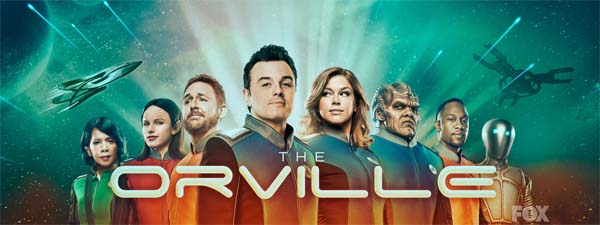
Discovery isn't the only Star Trek show on TV this fall -- at least, in spirit anyway. September saw the premiere of Seth McFarlane's Trek-clone The Orville. Orville stumbled out of the gates at first with a premiere episode that I really didn't like. But it's been slowly getting better -- or at least, less bad, with each of the first few episodes being substantially better (though still not entirely effective) than the premiere.
A lot of this has to do with a shift in the show's tone. The show was advertised and marketed as a comedy (basically, a televised version of Galaxy Quest), and I went into the first episode with a comedic mindset, and that premiere episode definitely went out of its way to try to tell jokes. That was a problem because the jokes (and by extension the show) just wasn't funny. The focus on comedy and gags also detracted from the serious drama, which was poorly-written, sloppily-executed, and which revolved around a dumb sci-fi MacGuffin. Further, much of the comedy involved stupid pop culture references which are going to quickly become dated; thus, hurting the show's lasting re-watchability if it ever becomes good enough to warrant rewatching.
If you think Star Trek needs more dick and fart jokes --
or more dogs licking their balls in the background, then The Orville is for you.
The problem is that MacFarlane just isn't that good at writing jokes. It pains me to say this because I was a huge fan of Family Guy when it first premiered, and I'll still defend the quality of those first two seasons. But MacFarlane seems to be completely arrogant in his own joke-writing ability, while simultaneously completely dismissive of the audience's ability to grasp the jokes that he seems to think are much more complex and clever than they actually are. Most of these jokes boil down to being fart or sex jokes, and very few work on more than the most juvenile and immature of levels. Perhaps the best example of this is a joke in which the Captain Mercer puts a distress call on the viewscreen. The distressed scientist has a dog in the background who spends the entire conversation licking his balls. It was mildly funny due to its relative subtlety. Yeah, I guess that probably happened occasionally to Captain Archer in Enterprise. Ha ha. But then as soon as the conversation was over, the viewscreen flicks off, and the navigator and helmsman say "Hey, did you see that dog licking his balls?" What little subtlety is gone; joke ruined!
It's like McFarlane thinks he has to remind the audience that there was a joke, and that you should have been laughing, even though the joke wasn't that funny to begin with. This is the same problem that I've always had with laugh tracks in sitcoms: all they do is remind me that the jokes aren't funny. Except McFarlane doesn't use a laugh track, he writes the "hey, there was a joke here. Did you get the joke?" into the script!
"Command Performance" had humor more appropriate for its sci-fi set-up and relationship drama.
The next two episodes, however, seemed to plant their feet more firmly in the territory of genuine sci-fi concepts and character drama, and the show was stronger for it. The execution, however, is kind of hit-or-miss... [More]
70d52091-ba33-4edf-9546-e800ddef74cf|1|1.0
Tags:the Orville, Seth MacFarlane, science fiction, comedy, Union, Moclan, Galaxy Quest, Star Trek, space, exploration, politics, religion, women, gender, gender equality, transgender, equality, futurism, progressive, allegory, straw man, fallacy
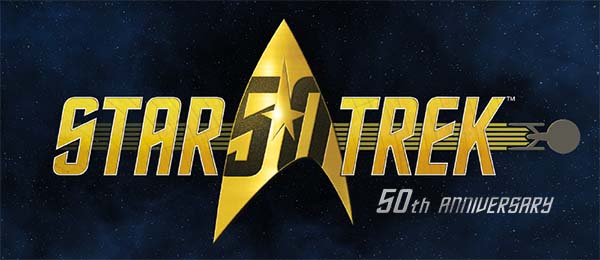
On September 8, 1966, a cultural revolution started. The first episode of a new science fiction television series named Star Trek premiered on NBC. This series broke new ground in the genre of science fiction by being one of the first series ever to present high science fiction concepts to television audiences, while also using its space adventures as allegories for contemporary social and political issues. While it presented itself as mindless space adventure in the same vein as Buck Rogers and Flash Gordon, it took a serious approach to science fiction that (at the time) was limited to literature like the novels of H.G. Wells and the stories of Isaac Asimov.
Star Trek wasn't the first serious science fiction television series. Shows like The Twilight Zone and The Outer Limits had existed for a almost a decade. But Star Trek differed from these series in that it depicted a revolutionarily positive and uplifting version of the future of humanity during the height of the paranoia of the Cold War. Humanity, according to Star Trek would overcome the threat of mutual destruction that the Cold War between the United States and the Soviet Union posed, and we would come out the other side with a spirit of cooperation and a desire to peacefully and benevolently explore the stars, exploring strange new worlds and seeking out new life and new civilizations.
Television science fiction was dominated by childish adventures like Buck Rogers
and more cynical anthology series like The Twilight Zone that drew off of Cold War paranoia.
The show was created by Gene Roddenberry, a former United States army air force pilot and Los Angeles police officer who eventually found his calling as a television writer and producer. He wrote and produced some police dramas and westerns before pitching his defining project: Star Trek. The show was picked up by Desilu Productions, a company that was run by Lucille Ball (yes, the titular actress of I Love Lucy) and her husband. The production of Star Trek was tumultuous. The show was canceled by NBC after its second season, only to be revived due to an unprecedented, fervent letter-writing campaign staged by its fans. It did not survive its third season, however, as Desilu Productions was rapidly running out of money, was forced to cut budgets, and NBC moved the show to the dreaded Friday night "death" slot. In an age before DVRs, or even VCRs, if people were out on the town on a Friday night, and they missed an episode of a show, then that episode simply went unseen.
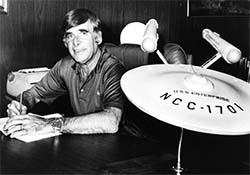
Gene Roddenberry's optimistic vision
of the future remains endearing.
The series eventually saw tremendous success after its cancellation due to its episodes being syndicated during the 1970's. It gained a cult following that grew and grew, setting up conventions that would come to draw thousands of attendees. Though not immediately apparent, Star Trek would grow to become one of (if not the) most successful science fiction properties in the world. The series is often cited by scientists, engineers, and astronauts as their inspirations for their careers, and the technology of the series has inspired many real-world technological innovations, such as wireless communication, mobile devices (in particularly mobile phones), speech-recognition software, and so on. Roddenberry became the first TV writer to receive a star on the Hollywood walk of fame, has been inducted into the Science Fiction Hall of Fame and the Academy of Television Arts & Sciences Hall of Fame, and was one of the first human beings ever to have his ashes carried into earth orbit... [More]
a36b33e8-1404-42b1-9723-a4759be0acee|2|5.0
Tags:Star Trek, Star Trek: the Next Generation, Star Trek: Deep Space Nine, Star Trek: Voyager, Star Trek: Enterprise, Star Trek: Discovery, Star Trek VI: the Undiscovered Country, Star Trek: Beyond, birthday, anniversary, science fiction, allegory, humanism, humanist, Gene Roddenberry, NBC, CBS, Fox, Paramount, Desilu Production, Lucille Ball, Cold War, Balance of Terror, The Measure of a Man, Kirk, Spock, Data, Gul Dukat, Seven of Nine, Star Trek the Experience, Las Vegas, Wallace Shawn, Grand Nagus Zek
|

| 12 | | | | | | | 60 | | 11 | | | | | | | 55 | | 10 | | | | | | | 50 | | 09 | | | | | | | 45 | | 08 | | | | | | | 40 | | 07 | | | | | | | 35 | | 06 | | | | | | | 30 | | 05 | | | | | | | 25 | | 04 | | | | | | | 20 | | 03 | | | | | | | 15 | | 02 | | | | | | | 10 | | 01 | | | | | | | 05 |
|